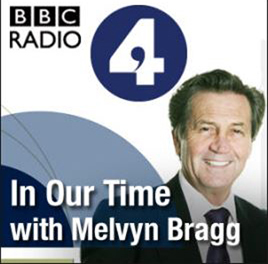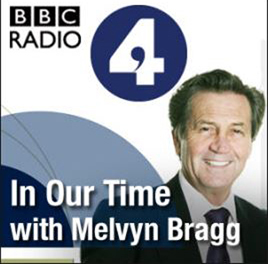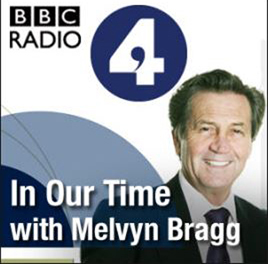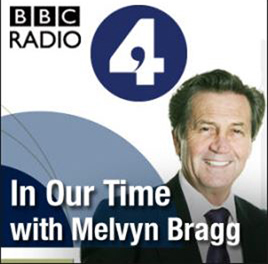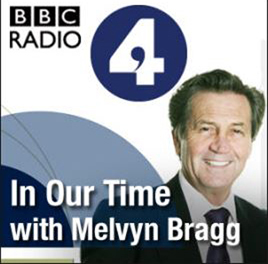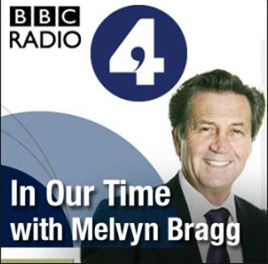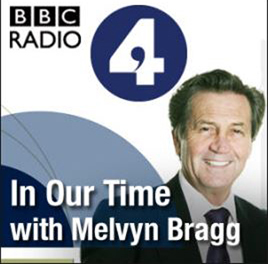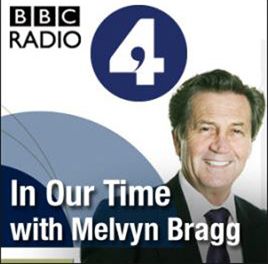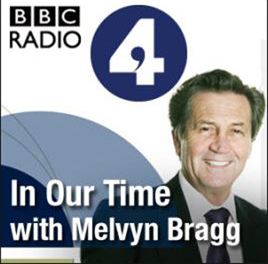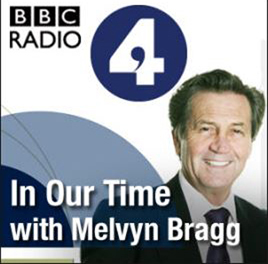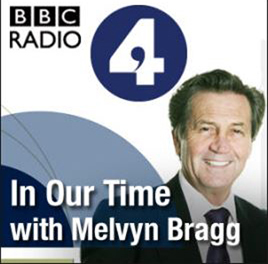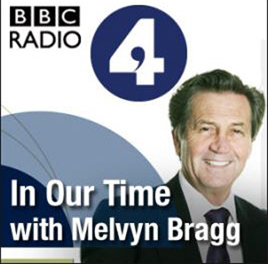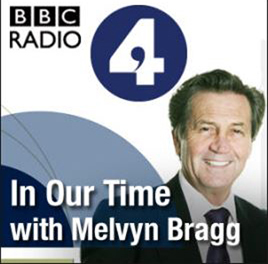Select one or more of these popular tags:
-
In Our Time - Space in Religion and Science
-
Melvyn Bragg
Melvyn Bragg and guests discuss the history of thought about space, and examines whether cyberspace has introduced a new concept of space in our world or if its roots are in Einsteinian physics.
Melvyn Bragg and guests discuss the history of thought about space, and examines whether cyberspace has introduced a new concept of space in our world or if its roots are in Einsteinian physics.
-
In Our Time - Tea: an empire in a teacup
-
Melvyn Bragg
After air and water, tea is the most widely consumed substance on the planet and the British national drink. In this country it helped define class and gender, it funded wars and propped up the economy of the Empire. The trade started in the 1660s with an official import of just 2 ounces, by 1801 24 million pounds of tea were coming in every year and people of all classes were drinking an average two cups a day. It was the first mass commodity, and the merchant philanthropist Jonas Hanway decried its hold on the nation, “your servants' servants, down to the very beggars, will not be satisfied unless they consume the produce of the remote country of China”. What drove the extraordinary take up of tea in this country? What role did it play in the global economy of the Empire and at what point did it stop becoming an exotic foreign luxury and start to define the essence of Englishness?
After air and water, tea is the most widely consumed substance on the planet and the British national drink. In this country it helped define class and gender, it funded wars and propped up the economy of the Empire. The trade started in the 1660s with an official import of just 2 ounces, by 1801 24 million pounds of tea were coming in every year and people of all classes were drinking an average two cups a day. It was the first mass commodity, and the merchant philanthropist Jonas Hanway decried its hold on the nation, “your servants' servants, down to the very beggars, will not be satisfied unless they consume the produce of the remote country of China”. What drove the extraordinary take up of tea in this country? What role did it play in the global economy of the Empire and at what point did it stop becoming an exotic foreign luxury and start to define the essence of Englishness?
-
In Our Time - The Abbasid Caliphs
-
Melvyn Bragg
The Abbasid Caliphs were the dynastic rulers of the Islamic world between the middle of the eighth and the tenth centuries. They headed a Muslim empire that extended from Tunisia through Egypt, Syria, Arabia, and Persia to Uzbekistan and the frontiers of India. But unlike previous conquerors, the Abbasid Caliphs presided over a multicultural empire where conversion was a relatively peaceful business. As Vikings raided the shores of Britain, the Abbasids were developing sophisticated systems of government, administration and court etiquette. Their era saw the flowering of Arabic philosophy, mathematics and Persian literature. The Abbasids were responsible for patronising the translation of Classical Greek texts and transmitting them back to a Europe emerging from the Dark Ages.
The Abbasid Caliphs were the dynastic rulers of the Islamic world between the middle of the eighth and the tenth centuries. They headed a Muslim empire that extended from Tunisia through Egypt, Syria, Arabia, and Persia to Uzbekistan and the frontiers of India. But unlike previous conquerors, the Abbasid Caliphs presided over a multicultural empire where conversion was a relatively peaceful business. As Vikings raided the shores of Britain, the Abbasids were developing sophisticated systems of government, administration and court etiquette. Their era saw the flowering of Arabic philosophy, mathematics and Persian literature. The Abbasids were responsible for patronising the translation of Classical Greek texts and transmitting them back to a Europe emerging from the Dark Ages.
-
In Our Time - The Age Of Doubt
-
Melvyn Bragg
Melvyn Bragg examines the spread of religious doubt over the last three centuries. With A N Wilson, novelist, biographer, journalist and author of God’s Funeral; Victoria Glendinning, author, journalist and biographer of Anthony Trollope and Jonathan Swift.
Melvyn Bragg examines the spread of religious doubt over the last three centuries. With A N Wilson, novelist, biographer, journalist and author of God’s Funeral; Victoria Glendinning, author, journalist and biographer of Anthony Trollope and Jonathan Swift.
-
In Our Time - The Aristocracy
-
Melvyn Bragg
The Greeks gave us the word aristocracy; it takes its root from ‘aristo’, meaning best and ‘kratos’, meaning rule or power. And for more than five hundred years Britain was ruled by a class that was defined, at the time, as the best. They founded their ascendancy on the twin pillars of land and heredity and in terms of privilege, preferment, power, style and wealth, they dominated British society. As the Earl of Chesterfield confidently informed the House of Lords in the mid-18th century, “We, my lords, may thank heaven that we have something better than our brains to depend upon.” What made the British Aristocracy the most successful power elite in the world? And what brought about its decline?
The Greeks gave us the word aristocracy; it takes its root from ‘aristo’, meaning best and ‘kratos’, meaning rule or power. And for more than five hundred years Britain was ruled by a class that was defined, at the time, as the best. They founded their ascendancy on the twin pillars of land and heredity and in terms of privilege, preferment, power, style and wealth, they dominated British society. As the Earl of Chesterfield confidently informed the House of Lords in the mid-18th century, “We, my lords, may thank heaven that we have something better than our brains to depend upon.” What made the British Aristocracy the most successful power elite in the world? And what brought about its decline?
-
In Our Time - The Artist
-
Melvyn Bragg
With Emma Barker, Lecturer in Art History, The Open University; Thomas Healy, Professor of Renaissance Studies at Birkbeck University of London; Tim Blanning, Professor of Modern European History at the University of Cambridge.
With Emma Barker, Lecturer in Art History, The Open University; Thomas Healy, Professor of Renaissance Studies at Birkbeck University of London; Tim Blanning, Professor of Modern European History at the University of Cambridge.
-
In Our Time - The Assassination of Tsar Alexander II
-
Melvyn Bragg
On 1st March 1881, the Russian Tsar, Alexander II, was travelling through the snow to the Winter Palace in St Petersburg. An armed Cossack sat with the coach driver, another six Cossacks followed on horseback and behind them came a group of police officers in sledges. It was the day that the Tsar, known for his liberal reforms, had signed a document granting the first ever constitution to the Russian people. But his journey was being watched by a group of radicals called 'Narodnaya Volya' or 'The People's Will'. On a street corner near the Catherine Canal, they hurled the first of their bombs to halt the Tsar's iron-clad coach. When Alexander ignored advice and ventured out onto the snow to comfort his dying Cossacks, he was killed by another bomber who took his own life in the blast.
On 1st March 1881, the Russian Tsar, Alexander II, was travelling through the snow to the Winter Palace in St Petersburg. An armed Cossack sat with the coach driver, another six Cossacks followed on horseback and behind them came a group of police officers in sledges. It was the day that the Tsar, known for his liberal reforms, had signed a document granting the first ever constitution to the Russian people. But his journey was being watched by a group of radicals called 'Narodnaya Volya' or 'The People's Will'. On a street corner near the Catherine Canal, they hurled the first of their bombs to halt the Tsar's iron-clad coach. When Alexander ignored advice and ventured out onto the snow to comfort his dying Cossacks, he was killed by another bomber who took his own life in the blast.
-
In Our Time - The Aztecs
-
Melvyn Bragg
According to legend, the origins of the Aztec empire lie on a mythical island called Aztlan - "place of the white herons" - in the north of Mexico. From there this nomadic group of Mesoamericans are said to have undertaken a pilgrimage south to the fertile valleys of Central America. In the space of just 200 years, they formed what has been called the largest, and arguably the most ruthless, pre-Hispanic empire in North America which, at its zenith, was to rule over approximately 500 small states, comprising by the 16th century some 6 million people.
According to legend, the origins of the Aztec empire lie on a mythical island called Aztlan - "place of the white herons" - in the north of Mexico. From there this nomadic group of Mesoamericans are said to have undertaken a pilgrimage south to the fertile valleys of Central America. In the space of just 200 years, they formed what has been called the largest, and arguably the most ruthless, pre-Hispanic empire in North America which, at its zenith, was to rule over approximately 500 small states, comprising by the 16th century some 6 million people.
-
In Our Time - The Baroque
-
Melvyn Bragg
Melvyn Bragg discusses the Baroque - a term used to describe a vast array of painting, music, architecture and sculpture from the 17th and 18th centuries. His guests this week are Tim Blanning, Professor of Modern European History and Fellow of Sidney Sussex College, University of Cambridge; Nigel Aston, Reader in Early Modern History at the University of Leicester; and Helen Hills, Professor of Art History at the University of York
Melvyn Bragg discusses the Baroque - a term used to describe a vast array of painting, music, architecture and sculpture from the 17th and 18th centuries. His guests this week are Tim Blanning, Professor of Modern European History and Fellow of Sidney Sussex College, University of Cambridge; Nigel Aston, Reader in Early Modern History at the University of Leicester; and Helen Hills, Professor of Art History at the University of York
-
In Our Time - The Brain : A History
-
Melvyn Bragg
Despite dissections of brains both human and animal throughout the following centuries, in 1669 the Danish anatomist, Nicolaus Steno, still lamented that, “the brain, the masterpiece of creation, is almost unknown to us.” Why was the brain seen as a mystery for so long and how have our perceptions of how it works and what it symbolises changed over the centuries?
Despite dissections of brains both human and animal throughout the following centuries, in 1669 the Danish anatomist, Nicolaus Steno, still lamented that, “the brain, the masterpiece of creation, is almost unknown to us.” Why was the brain seen as a mystery for so long and how have our perceptions of how it works and what it symbolises changed over the centuries?
-
In Our Time - The Brain and Consciousness
-
Melvyn Bragg
With Steven Rose, Professor of Biology and Director of the Brain and Behaviour Research Group, Open University, Dan Robinson, Distinguished Research Professor, Georgetown University and visiting lecturer in Philosophy and Senior Member of Linacre College, Oxford University.
With Steven Rose, Professor of Biology and Director of the Brain and Behaviour Research Group, Open University, Dan Robinson, Distinguished Research Professor, Georgetown University and visiting lecturer in Philosophy and Senior Member of Linacre College, Oxford University.
-
In Our Time - The Brothers Grimm
-
Melvyn Bragg
Melvyn Bragg is joined by Juliette Wood, Mariner Warner and Tony Phelan to discuss the weird and wonderful worlds of the Brothers Grimm
Melvyn Bragg is joined by Juliette Wood, Mariner Warner and Tony Phelan to discuss the weird and wonderful worlds of the Brothers Grimm
-
In Our Time - The Celts
-
Melvyn Bragg
Around 400 BC a great swathe of Western Europe from Ireland to Southern Russia was dominated by one civilisation. Perched on the North Western fringe of this vast Iron Age culture were the British who shared many of the religious, artistic and social customs of their European neighbours. These customs were Celtic and this civilisation was the Celts.
Around 400 BC a great swathe of Western Europe from Ireland to Southern Russia was dominated by one civilisation. Perched on the North Western fringe of this vast Iron Age culture were the British who shared many of the religious, artistic and social customs of their European neighbours. These customs were Celtic and this civilisation was the Celts.
-
In Our Time - The Consolation Of Philosophy
-
Melvyn Bragg
The Consolation of Philosophy was read widely and a sense of consolation is woven into many philosophical ideas, but what for Boethius were the consolations of philosophy, what are they more generally and should philosophy lead us to consolation or lead us from it?
The Consolation of Philosophy was read widely and a sense of consolation is woven into many philosophical ideas, but what for Boethius were the consolations of philosophy, what are they more generally and should philosophy lead us to consolation or lead us from it?
Edward Gibbon wrote of the decline of the Roman Empire, "While that great body was invaded by open violence, or undermined by slow decay, a pure and humble religion gently insinuated itself into the minds of men, grew up in silence and obscurity, derived new vigour from opposition, and finally erected the triumphant banner of the cross on the ruins of the Capitol."
Edward Gibbon wrote of the decline of the Roman Empire, "While that great body was invaded by open violence, or undermined by slow decay, a pure and humble religion gently insinuated itself into the minds of men, grew up in silence and obscurity, derived new vigour from opposition, and finally erected the triumphant banner of the cross on the ruins of the Capitol."
-
In Our Time - The Diet of Worms
-
Diarmaid MacCulloch, David Bagchi & Charlotte Methuen
Nestled on a bend of the River Rhine, in the South West corner of Germany, is the City of Worms. It’s one of the oldest cities in central Europe; it still has its early city walls, its 11th century Romanesque cathedral and a 500-year-old printing industry, but in its centre is a statue of the monk, heretic and founder of the Protestant Reformation, Martin Luther. In 1521 Luther came to Worms to explain his attacks on the Catholic Church to the Holy Roman Emperor, Charles V, and the gathered dignitaries of the German lands. What happened at that meeting, called the Diet of Worms, tore countries apart, set nation against nation, felled kings and plunged dynasties into suicidal bouts of infighting.
Nestled on a bend of the River Rhine, in the South West corner of Germany, is the City of Worms. It’s one of the oldest cities in central Europe; it still has its early city walls, its 11th century Romanesque cathedral and a 500-year-old printing industry, but in its centre is a statue of the monk, heretic and founder of the Protestant Reformation, Martin Luther. In 1521 Luther came to Worms to explain his attacks on the Catholic Church to the Holy Roman Emperor, Charles V, and the gathered dignitaries of the German lands. What happened at that meeting, called the Diet of Worms, tore countries apart, set nation against nation, felled kings and plunged dynasties into suicidal bouts of infighting.
-
In Our Time - The East India Company
-
Melvyn Bragg
At its peak, its influence stretched from western India to eastern China via the farthest reaches of the Indonesian archipelago. It had a fleet of 130 twelve hundred tonne ships and commanded an army of 200,000 troops that came to dominate the Indian subcontinent. It funded governments, toppled princes and generated spectacular amounts of money from trading textiles and spices. But this wasn’t an empire, it wasn’t even a state, it was a company. The East India Company, founded in 1600, lasted for 258 years before the British state gained full control of its activities. In that time it had redrawn the map of India, built an empire and reinvented the fashions and the foodstuffs of Britain.
At its peak, its influence stretched from western India to eastern China via the farthest reaches of the Indonesian archipelago. It had a fleet of 130 twelve hundred tonne ships and commanded an army of 200,000 troops that came to dominate the Indian subcontinent. It funded governments, toppled princes and generated spectacular amounts of money from trading textiles and spices. But this wasn’t an empire, it wasn’t even a state, it was a company. The East India Company, founded in 1600, lasted for 258 years before the British state gained full control of its activities. In that time it had redrawn the map of India, built an empire and reinvented the fashions and the foodstuffs of Britain.
-
In Our Time - The Empire of Genghis Khan
-
Peter Jackson, Naomi Standen & George Lane
Temujin was cast out by his tribe when he was just a child and left to struggle for survival on the harsh Steppes of what is now Mongolia. From these humble beginnings he went on to become Genghis Khan, leader of the greatest continuous land-based empire the world has ever seen. His conquered territories stretched from the Caspian Sea to the borders of Manchuria, from the Siberian forest to what is now Afghanistan. He was a charismatic commander and a shrewd military tactician. He was swift to promote those who served him well, ignoring race or creed, but vengeful to those who crossed him, killing every inhabitant of a resistant town, even the cats and dogs. Generally regarded as barbarians by their enemies, the Mongol armies were in fact disciplined and effective.
Temujin was cast out by his tribe when he was just a child and left to struggle for survival on the harsh Steppes of what is now Mongolia. From these humble beginnings he went on to become Genghis Khan, leader of the greatest continuous land-based empire the world has ever seen. His conquered territories stretched from the Caspian Sea to the borders of Manchuria, from the Siberian forest to what is now Afghanistan. He was a charismatic commander and a shrewd military tactician. He was swift to promote those who served him well, ignoring race or creed, but vengeful to those who crossed him, killing every inhabitant of a resistant town, even the cats and dogs. Generally regarded as barbarians by their enemies, the Mongol armies were in fact disciplined and effective.
-
In Our Time - The Encyclopédie
-
Melvyn Bragg
This week we explore the mammoth undertaking that was the Encyclopédie – one of its editors, D’Alembert, described its mission as giving an overview of knowledge, as if gazing down on a vast labyrinth of all the branches of human knowledge, observing where they separate or unite and even catching sight of the secret routes between them. It was a project that attracted some of the greatest thinkers of the Enlightenment - Voltaire, Rousseau and Diderot - striving to bring together all that was known of the world in one comprehensive encyclopedia. No subject was too great or too small, so while Voltaire wrote of “fantasie” and “elegance”, Diderot rolled up his sleeves and got to grips with trades and crafts, even jam-making.
This week we explore the mammoth undertaking that was the Encyclopédie – one of its editors, D’Alembert, described its mission as giving an overview of knowledge, as if gazing down on a vast labyrinth of all the branches of human knowledge, observing where they separate or unite and even catching sight of the secret routes between them. It was a project that attracted some of the greatest thinkers of the Enlightenment - Voltaire, Rousseau and Diderot - striving to bring together all that was known of the world in one comprehensive encyclopedia. No subject was too great or too small, so while Voltaire wrote of “fantasie” and “elegance”, Diderot rolled up his sleeves and got to grips with trades and crafts, even jam-making.
-
In Our Time - The Great Exhibition
-
Jeremy Black, Hermione Hobhouse & Clive Emsley
By the time the exhibition closed, one quarter of the entire British population had visited Crystal Palace, the first pre-fabricated building of its kind, to marvel at an extraordinary array of exhibits amongst which were: the biggest diamond in the world, a carriage drawn by kites, furniture made of coal, and a set of artificial teeth fitted with a swivel devise which allowed the user to yawn without displacing them. Its impact was huge in terms of the development of British manufacturing, the burgeoning of a global consumer market, the development of museums and the international standing of Britain culturally and technologically. How did the Exhibition crystallise a particular moment in early Victorian Britain?
By the time the exhibition closed, one quarter of the entire British population had visited Crystal Palace, the first pre-fabricated building of its kind, to marvel at an extraordinary array of exhibits amongst which were: the biggest diamond in the world, a carriage drawn by kites, furniture made of coal, and a set of artificial teeth fitted with a swivel devise which allowed the user to yawn without displacing them. Its impact was huge in terms of the development of British manufacturing, the burgeoning of a global consumer market, the development of museums and the international standing of Britain culturally and technologically. How did the Exhibition crystallise a particular moment in early Victorian Britain?
-
In Our Time - The Great Fire Of London
-
Melvyn Bragg
The Great Fire of London was a conflagration of unimaginable proportions – up to a third of the city was destroyed – but the burning of London, the interpretation of the fire and the arguments and ideas about what should be rebuilt give an insight into a city and a period that housed the Royal Society and the restored Stuart monarchy, a place of religious anxiety and fear of foreign invasion in a country still haunted by the Civil War.
The Great Fire of London was a conflagration of unimaginable proportions – up to a third of the city was destroyed – but the burning of London, the interpretation of the fire and the arguments and ideas about what should be rebuilt give an insight into a city and a period that housed the Royal Society and the restored Stuart monarchy, a place of religious anxiety and fear of foreign invasion in a country still haunted by the Civil War.
-
In Our Time - The Great Reform Act
-
Melvyn Bragg
Mevlyn Bragg discusses the Great Reform Act of 1832, a landmark on the road to British democracy. Melvyn is joined by Dinah Birch, Professor of English at Liverpool University; Michael Bentley, Professor of Modern History at the University of St Andrews; and Catherine Hall, Professor of Modern British Social and Cultural History at University College London.
Mevlyn Bragg discusses the Great Reform Act of 1832, a landmark on the road to British democracy. Melvyn is joined by Dinah Birch, Professor of English at Liverpool University; Michael Bentley, Professor of Modern History at the University of St Andrews; and Catherine Hall, Professor of Modern British Social and Cultural History at University College London.
-
In Our Time - The Individual
-
Melvyn Bragg
With Richard Wollheim, Professor of Philosophy, University of California in Berkeley; Jonathan Dollimore, Professor of English, York University.
With Richard Wollheim, Professor of Philosophy, University of California in Berkeley; Jonathan Dollimore, Professor of English, York University.
-
In Our Time - The Jesuits
-
Melvyn Bragg
Today we’re discussing the Jesuits, a Catholic religious order of priests who became known as “the school masters of Europe”. Founded in the 16th century by the soldier Ignatius Loyola, they became a major force throughout the world, from China to South America. “Give us a boy and we will return you a man, a citizen of his country and a child of God”, they declared. By the 17th century there were more than 500 schools established across Europe. Their ideas about a standardised curriculum and teaching became the basis for many education systems today.
Today we’re discussing the Jesuits, a Catholic religious order of priests who became known as “the school masters of Europe”. Founded in the 16th century by the soldier Ignatius Loyola, they became a major force throughout the world, from China to South America. “Give us a boy and we will return you a man, a citizen of his country and a child of God”, they declared. By the 17th century there were more than 500 schools established across Europe. Their ideas about a standardised curriculum and teaching became the basis for many education systems today.
-
In Our Time - The Library at Alexandria
-
Melvyn Bragg
Melvyn Bragg is joined by Simon Goldhill, Matthew Nichols and Serafina Cuomo to discuss the ancient Library of Alexandria - one of the most ambitious knowledge projects of its time
Melvyn Bragg is joined by Simon Goldhill, Matthew Nichols and Serafina Cuomo to discuss the ancient Library of Alexandria - one of the most ambitious knowledge projects of its time
-
In Our Time - The Mughal Empire
-
Melvyn Bragg
At its height, the Mughal Empire stretched from Bengal in the East to Gujarat in the West, and from Lahore in the North to Madras in the South. It covered the whole of present day northern India, Pakistan, Afghanistan and Bangladesh, and became famous for the Taj Mahal, the Koh-i-Noor and the Peacock Throne. In 1631 a Dutch naturalist Johannes de Laet published his account of the vast Empire, “the nobles live in indescribable luxury and extravagance, caring only to indulge themselves whilst they can, in every kind of pleasure. Their greatest magnificence is in their women’s quarters, for they marry three or four wives or sometimes more”.
At its height, the Mughal Empire stretched from Bengal in the East to Gujarat in the West, and from Lahore in the North to Madras in the South. It covered the whole of present day northern India, Pakistan, Afghanistan and Bangladesh, and became famous for the Taj Mahal, the Koh-i-Noor and the Peacock Throne. In 1631 a Dutch naturalist Johannes de Laet published his account of the vast Empire, “the nobles live in indescribable luxury and extravagance, caring only to indulge themselves whilst they can, in every kind of pleasure. Their greatest magnificence is in their women’s quarters, for they marry three or four wives or sometimes more”.
-
In Our Time - The Music of the Spheres
-
Melvyn Bragg
Melvyn Bragg considers the celestial harmonies of the planets, a Pythagorean concept which fascinated astrologists, artists and mathematicians for centuries. He is joined by Peter Forshaw, Postdoctoral Fellow at Birkbeck, University of London
Melvyn Bragg considers the celestial harmonies of the planets, a Pythagorean concept which fascinated astrologists, artists and mathematicians for centuries. He is joined by Peter Forshaw, Postdoctoral Fellow at Birkbeck, University of London
-
In Our Time - The Needham Question
-
Melvyn Bragg
Why did Modern Science develop in Europe when China seemed so much better placed to achieve it? This is called the Needham Question, after Joseph Needham, the 20th century British Sinologist who did more, perhaps, than anyone else to try and explain it. Why did China’s early technological brilliance not lead to the development of modern science and how did momentous inventions like gunpowder and printing enter Chinese society with barely a ripple and yet revolutionise the warring states of Europe?
Why did Modern Science develop in Europe when China seemed so much better placed to achieve it? This is called the Needham Question, after Joseph Needham, the 20th century British Sinologist who did more, perhaps, than anyone else to try and explain it. Why did China’s early technological brilliance not lead to the development of modern science and how did momentous inventions like gunpowder and printing enter Chinese society with barely a ripple and yet revolutionise the warring states of Europe?
-
In Our Time - The Opium Wars
-
Yangwen Zheng, Lars Laamann & Xun Zhou
The Opium Wars between Britain and China in the 19th century forced China to open its doors to trade with the western world. The Chinese had banned opium in its various forms several times, citing concern for public morals, but the prohibition was ignored. The East India Company held a monopoly on the production of opium in British India. Private British traders continued to smuggle large quantities of opium into China. In this way, the opium trade became a way of balancing a trade deficit brought about by Britain's own addiction to tea. The Chinese protested against the flouting of the ban but the British continued to trade, leading to a crackdown by Lin Tse-Hsu, a man appointed to be China's Opium Drugs Czar. He confiscated opium from the British traders and destroyed it.
The Opium Wars between Britain and China in the 19th century forced China to open its doors to trade with the western world. The Chinese had banned opium in its various forms several times, citing concern for public morals, but the prohibition was ignored. The East India Company held a monopoly on the production of opium in British India. Private British traders continued to smuggle large quantities of opium into China. In this way, the opium trade became a way of balancing a trade deficit brought about by Britain's own addiction to tea. The Chinese protested against the flouting of the ban but the British continued to trade, leading to a crackdown by Lin Tse-Hsu, a man appointed to be China's Opium Drugs Czar. He confiscated opium from the British traders and destroyed it.
-
In Our Time - The Peasants' Revolt: A Lasting Legacy for Popular Revolt?
-
Miri Rubin, Caroline Barron & Alastair Dunn
"When Adam delved and Eve span, who was then the Gentleman?" – the opening words of a rousing sermon, said to be by John Ball, which fires a broadside at the deeply hierarchical nature of fourteenth century England. Ball, along with Wat Tyler, was one of the principal leaders of the Peasants’ Revolt – his sermon ends: "I exhort you to consider that now the time is come, appointed to us by God, in which ye may (if ye will) cast off the yoke of bondage, and recover liberty". The subsequent events of June 1381 represent a pivotal and thrilling moment in England’s history, characterised by murder and mayhem, beheadings and betrayal, a boy-King and his absent uncle, and a general riot of destruction and death.
"When Adam delved and Eve span, who was then the Gentleman?" – the opening words of a rousing sermon, said to be by John Ball, which fires a broadside at the deeply hierarchical nature of fourteenth century England. Ball, along with Wat Tyler, was one of the principal leaders of the Peasants’ Revolt – his sermon ends: "I exhort you to consider that now the time is come, appointed to us by God, in which ye may (if ye will) cast off the yoke of bondage, and recover liberty". The subsequent events of June 1381 represent a pivotal and thrilling moment in England’s history, characterised by murder and mayhem, beheadings and betrayal, a boy-King and his absent uncle, and a general riot of destruction and death.

